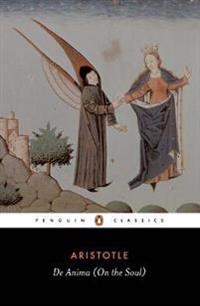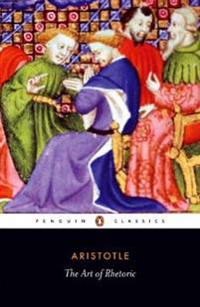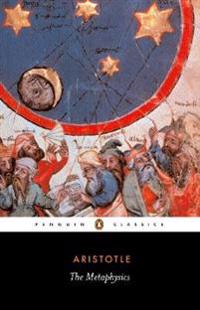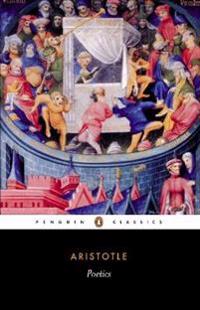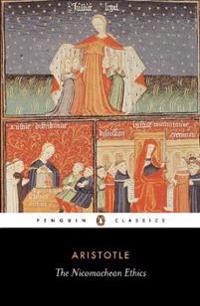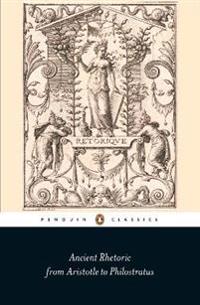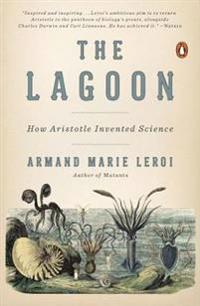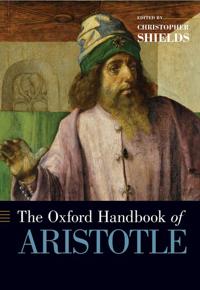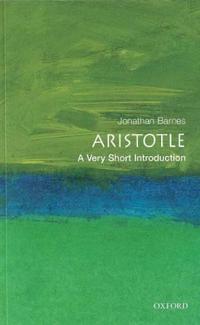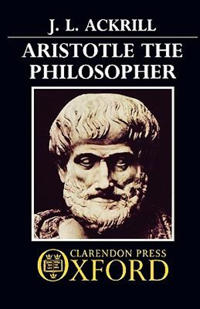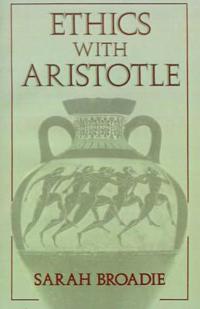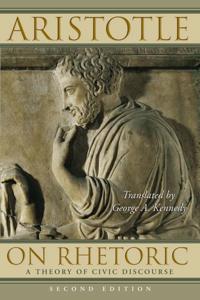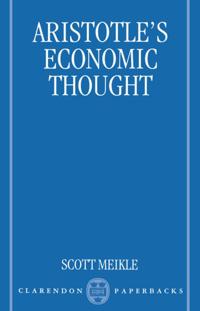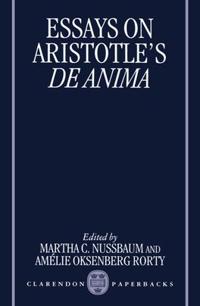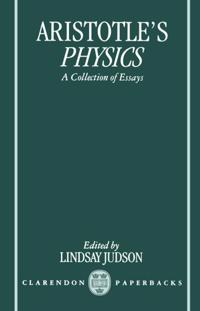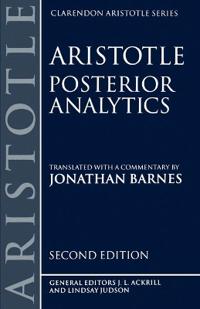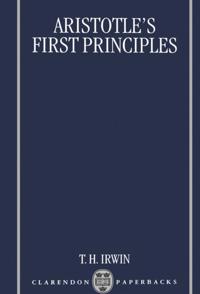De Anima (Storpocket)
avAristotle
ISBN: 9780140444711 - UTGIVEN: 1987-01For the Pre-Socratic philosophers the soul was the source of movement and sensation, while for Plato it was the seat of being, metaphysically distinct from the body that it was forced temporarily to inhabit. Plato's student Aristotle was determined to test the truth of both these beliefs against the[...]
The Art of Rhetoric (Storpocket)
avAristotle
ISBN: 9780140445107 - UTGIVEN: 199110With the emergence of democracy in the city-state of Athens in the years around 460 BC, public speaking became an essential skill for politicians in the Assemblies and Councils and even for ordinary citizens in the courts of law. In response, the technique of rhetoric rapidly developed, bringing vir[...]
The Metaphysics (Storpocket)
avAristotle
ISBN: 9780140446197 - UTGIVEN: 199810Aristotle's probing inquiry into some of the fundamental problems of philosophy, "The Metaphysics" is one of the classical Greek foundation-stones of western thought, translated from the with an introduction by Hugh Lawson-Tancred in "Penguin Classics". "The Metaphysics" presents Aristotle's mature [...]
Poetics (Storpocket)
avAristotle
ISBN: 9780140446364 - UTGIVEN: 199609Essential reading for all students of Greek theatre and literature, Aristotle's "Poetics" remains equally stimulating for anyone interested in literature. This "Penguin Classics" edition is translated with an introduction and notes by Malcolm Heath. In his near-contemporary account of classical Gree[...]
The Nicomachean Ethics (Storpocket)
avAristotle
ISBN: 9780140449495 - UTGIVEN: 200401Previously published as Ethics, Aristotle's "The Nicomachean Ethics" addresses the question of how to live well, and originates the concept of cultivating a virtuous character as the basis of his ethical system. This "Penguin Classics" edition is translated from the Greek by J.A.K. Thomson with revi[...]
Ancient Rhetoric: From Aristotle to Philostratus (häftad)
ISBN: 9780141392646 - UTGIVEN: 2018-04A new and original anthology that introduces the use of rhetoric in the classical world, from Aristotle to Cicero and beyond
Classical rhetoric is one of the earliest versions of what is today known as media studies. It was absolutely crucial to life in the ancient world, whether in the cour[...]The Lagoon: How Aristotle Invented Science (häftad)
ISBN: 9780143127987 - UTGIVEN: 2015-12The remarkable but neglected story of Aristotle s founding role in the scientific study of nature
Both a travelogue and a study of the origins of science, "The Lagoon" shows how an ancient thinker still has much to teach us today. Aristotle s philosophy looms large over the history of Western t[...]Aristotle's Children (Häftad)
ISBN: 9780156030090 - UTGIVEN: 2004-11Europe was in the long slumber of the Middle Ages, the Roman Empire was in tatters, and the Greek language was all but forgotten, until a group of twelfth-century scholars rediscovered and translated the works of Aristotle. His ideas spread like wildfire across Europe, offering the scientific view t[...]
The Oxford Handbook of Aristotle
ISBN: 9780190244842 - UTGIVEN: 2015-05The Oxford Handbook of Aristotle reflects the lively international character of Aristotelian studies, drawing contributors from the United Kingdom, the United States, Germany, France, Switzerland, Italy, Canada, and Japan; it also, appropriately, includes a preponderance of authors from the Universi[...]
Aristotle (Häftad)
avJonathan Barnes
ISBN: 9780192854087 - UTGIVEN: 200010The influence of Aristotle, the prince of philosophers, on the intellectual history of the West is second to none. In this book Jonathan Barnes examines Aristotle's scientific researches, his discoveries in logic and his metaphysical theories, his work in psychology and in ethics and politics, and [...]
Aristotle the Philosopher
ISBN: 9780192891181 - UTGIVEN: 1981-10Discusses Aristotle's views on change, natural science, the mind, logic, philosophical method, metaphysics, and ethics, and suggests why the Greek philosopher still provokes controversy.[...]
Ethics with Aristotle (Häftad)
avSarah Broadie
ISBN: 9780195085600 - UTGIVEN: 199307In this book, Sarah Broadie gives a close and comprehensive analysis of the main themes of Aristotle's ethics. She concentrates on his discussions of happiness, virtue, voluntary agency, practical reason, incontinence, pleasure, and the place of theory in the best life. The book makes a major contri[...]
The Oxford Handbook of Aristotle (Inbunden)
ISBN: 9780195187489 - UTGIVEN: 2012-09The Oxford Handbook of Aristotle reflects the lively international character of Aristotelian studies, drawing contributors from the United Kingdom, the United States, Germany, France, Switzerland, Italy, Canada, and Japan; it also, appropriately, includes a preponderance of authors from the Universi[...]
On Rhetoric (Häftad)
avAristotle, George A. Kennedy
ISBN: 9780195305098 - UTGIVEN: 200608Based on careful study of the Greek text and informed by the best modern scholarship, the second edition of this highly acclaimed translation offers the most faithful English version ever published of "On Rhetoric". Updated in light of recent scholarship, the new edition features a revised introduct[...]
Analytica Priora Et Posteriora (Inbunden)
avAristotle
ISBN: 9780198145622 - UTGIVEN: 1964-08-27One of Aristotle's logic treatises, this text is published in the "Oxford Classical Text" series.
Aristotle's Economic Thought (Häftad)
avScott Meikle
ISBN: 9780198152255 - UTGIVEN: 199703'[Meikle's] aim is to make proper sense of Aristotle's economic thinking, and in a detailed, lucid discussion he succeeds brilliantly.' - Peter Jones, Sunday Telegraph. Aristotle's work on money was the backbone of medieval thinking about commerce, and it is still the foundation of Catholic teaching[...]
Essays on Aristotle's "De Anima" (Häftad)
avNicholas Cook
ISBN: 9780198236009 - UTGIVEN: 199511Aristotle's philosophy of mind has recently attracted renewed attention and respect from philosophers. This volume brings together outstanding new essays on De Anima by a distinguished international group of contributors including, in this paperback edition, a new essay by Myles Burnyeat. The essays[...]
Aristotle's "Physics" (Häftad)
ISBN: 9780198236023 - UTGIVEN: 199509The Physics is one of Aristotle's masterpieces - a work of extraordinary intellectual power which has had a profound influence on the development of metaphysics and the philosophy of science, as well as on the development of physics itself. This collection of ten new essays by leading Aristotelian s[...]
Topics Books I and VIII: With Excerpts from Related Texts: Books 1 & 8 (Pocket)
avAristotle
ISBN: 9780198239420 - UTGIVEN: 1997-01-16De Anima (Pocket)
avAristotle, D. W. (TRN) Hamlyn, D. W. Hamlyn
ISBN: 9780198240853 - UTGIVEN: 1993-11Aristotle's "De Anima" has a claim to be the first systematic treatment of issues in the philosophy of mind, and also to be one of the greatest works on the subject. This volume provides an accurate translation of Books 2 and 3, together with some sections of Book 1. Particular attention has been gi[...]
Posterior Analytics (Häftad)
avAristotle
ISBN: 9780198240891 - UTGIVEN: 199401The Posterior Analytics contains some of Aristotle's most influential thoughts in logic, epistemology, metaphysics, and the philosophy of science. The first book expounds and develops the notions of a demonstrative argument and of a formal, axiomatized science; the second discusses a cluster of prob[...]
Aristotle's First Principles
ISBN: 9780198242901 - UTGIVEN: 1990-05Aristotle's reliance on dialectic as a method of philosophy appears to conflict with his metaphysical realist view of his conclusions. This book explores Aristotle's philosophical method and the merits of his conclusions, and shows how he defends dialectic against the objection that it cannot justi[...]
Aristotle's Theory of Moral Insight (Inbunden)
avTroels Engberg-Pedersen
ISBN: 9780198246671 - UTGIVEN: 1983-06-30

